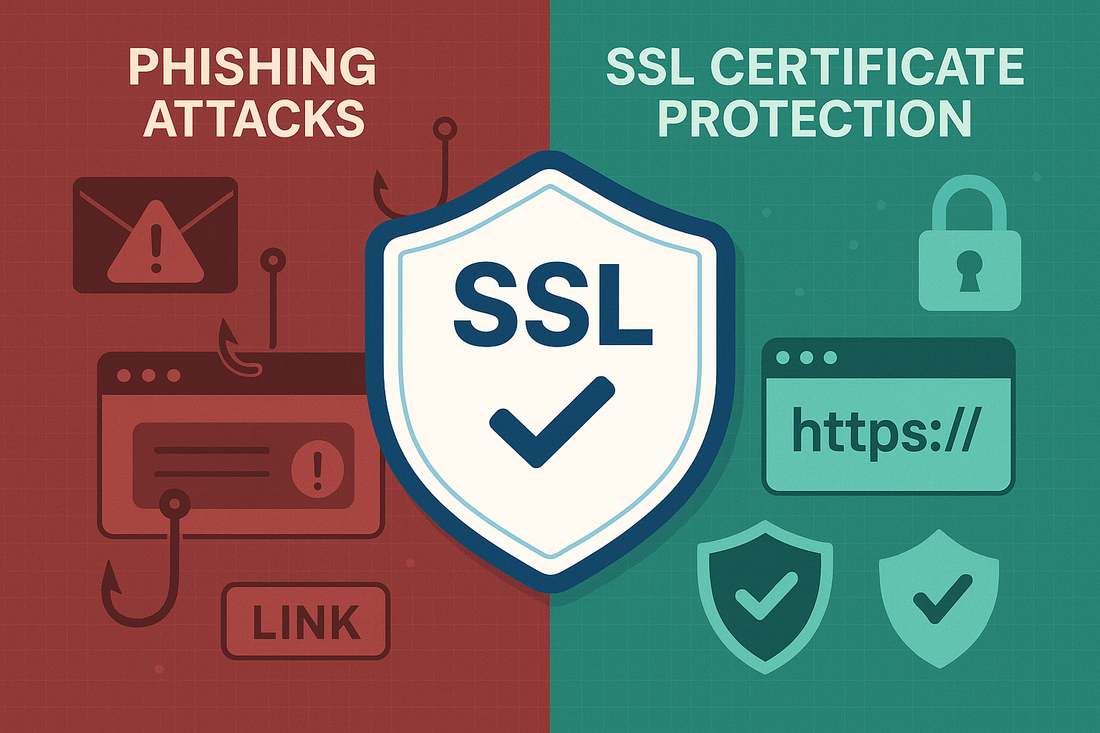
Phishing Attacks and SSL Certificates
Jennifer WalshShare
Phishing attacks remain one of the most prevalent cybersecurity threats facing organizations today.
As a leading provider of SSL Certificates, Trustico® helps businesses protect their websites and users from sophisticated phishing attempts through advanced SSL Certificate security solutions.
Understanding Phishing Attacks
Phishing attacks typically involve fraudulent attempts to steal sensitive information by impersonating legitimate websites and businesses.
Cybercriminals create convincing replicas of trusted sites to deceive users into sharing login credentials, financial details, or other confidential data.
The most effective defense against phishing starts with proper website security through Trustico® SSL Certificates. Our SSL Certificates provide visual trust indicators that help users verify they are on legitimate websites rather than sophisticated phishing copies.
Modern phishing techniques have evolved beyond simple e-mail scams to include highly targeted spear-phishing, clone phishing, and whaling attacks that target specific individuals or organizations.
These sophisticated approaches often use social engineering tactics alongside technical deception to appear more convincing.
The financial impact of successful phishing attacks can be devastating. Organizations face direct monetary losses, remediation costs, regulatory penalties, and significant damage to customer trust and brand reputation.
Implementing proper SSL Certificate security through Trustico® is a critical step in preventing these costly incidents.
How Trustico® SSL Certificates Prevent Phishing
Trustico® offers both Organization Validated (OV) and Extended Validation (EV) SSL Certificates that include rigorous identity verification. These high-assurance SSL Certificates display prominent visual indicators in users browsers, helping visitors confirm they are on an authentic website.
Our premium Sectigo® branded SSL Certificates feature the strongest encryption available and include additional anti-phishing protections. The distinctive padlock icon and green address bar provided by our EV SSL Certificates give users instant visual confirmation they have reached a legitimate website.
Domain Validation (DV) SSL Certificates verify domain ownership but provide limited anti-phishing protection.
For businesses concerned about phishing threats, Trustico® recommends Organization Validation (OV) or Extended Validation (EV) SSL Certificates that verify actual business identity in addition to domain control.
The validation process for Trustico® OV and EV SSL Certificates involves thorough verification of business registration documents, physical address confirmation, and operational status checks. This comprehensive validation makes it extremely difficult for phishers to obtain legitimate SSL Certificates for fraudulent websites.
Visual Trust Indicators and User Awareness
The visual trust indicators provided by Trustico® SSL Certificates play a crucial role in helping users identify legitimate websites. Modern browsers display these indicators prominently, making it easier for even non-technical users to verify website authenticity before entering sensitive information.
Extended Validation (EV) SSL Certificates from Trustico® provide the most visible trust indicators, including the organization name displayed directly in the browser address bar in many browsers. This prominent display helps users quickly verify they are on the legitimate website rather than a phishing copy.
Mobile device users benefit from the same SSL Certificate security provided by Trustico® as all of our SSL Certificates display appropriate trust indicators on mobile browsers, ensuring consistent protection across all devices as mobile phishing attacks become increasingly common.
Essential Anti-Phishing Features
All Trustico® SSL Certificates include critical security features that help prevent phishing : Strong SHA-256 encryption, 2048-bit signatures, and compatibility with all major browsers and mobile devices. This ensures maximum protection and visibility of security indicators to users.
For enhanced phishing prevention, our Extended Validation (EV) SSL Certificates undergo the most thorough vetting process. This includes detailed verification of organization identity and domain ownership before the SSL Certificate is issued.
Certificate Transparency (CT) logging is included with all Trustico® SSL Certificates, creating a public record of every issued SSL Certificate. This transparency helps detect unauthorized SSL Certificates that might be used in phishing attacks and allows for rapid identification and revocation of fraudulent SSL Certificates.
Online Certificate Status Protocol (OCSP) stapling enhances the security of Trustico® SSL Certificates by providing efficient, privacy-preserving SSL Certificate validation. This feature helps browsers quickly verify that an SSL Certificate hasn't been revoked, providing an additional layer of protection against sophisticated phishing attempts using compromised SSL Certificates.
Implementation Best Practices
Proper SSL Certificate implementation is crucial for effective phishing protection.
Trustico® provides comprehensive installation guides and technical support to ensure correct configuration. We recommend implementing HSTS (HTTP Strict Transport Security) alongside SSL Certificates for maximum security.
Regular SSL Certificate maintenance and renewal is essential. Trustico® offers automated renewal reminders and management tools to prevent SSL Certificate expiration that could create security vulnerabilities.
Implementing HTTP Strict Transport Security (HSTS) with your Trustico® SSL Certificate prevents downgrade attacks that could enable phishing. HSTS instructs browsers to always use secure connections to your website, eliminating opportunities for attackers to intercept connections before encryption is established.
Proper configuration of Content Security Policy (CSP) headers works alongside your Trustico® SSL Certificate to prevent content injection attacks often used in sophisticated phishing attempts. CSP restricts which resources can load on your website, preventing attackers from injecting malicious scripts or redirects.
Regular security scanning of your website complements the protection provided by Trustico® SSL Certificates. These scans can identify vulnerabilities that phishers might exploit and verify that your SSL Certificate is properly implemented across all pages and subdomains.
Addressing Lookalike Domains
Lookalike domain registration is a common phishing tactic where attackers register domains that appear visually similar to legitimate websites. Trustico® recommends registering common misspellings and variant domains of your primary domain, then securing them with SSL Certificates that redirect to your authentic website.
Internationalized Domain Name (IDN) homograph attacks use characters from different languages that appear identical to Latin characters. Protecting against these sophisticated attacks requires monitoring for lookalike registrations and implementing proper SSL Certificate validation to help users identify legitimate websites.
Early detection of lookalike domains allows for prompt action before these domains can be used in phishing campaigns targeting your customers.
Certificate Authority Authorization (CAA) DNS records specify which Certificate Authorities are authorized to issue SSL Certificates for your domain. Implementing CAA records alongside your Trustico® SSL Certificates prevents unauthorized issuance of SSL Certificates that could be used in sophisticated phishing attacks.
Additional Anti-Phishing Measures
While Trustico® SSL Certificates provide foundational security, organizations should implement multiple layers of phishing protection. This includes employee security awareness training, e-mail filtering systems, and regular security assessments.
Trustico® recommends combining our SSL Certificates with additional security measures like malware scanning and vulnerability testing.
E-Mail authentication protocols like SPF, DKIM, and DMARC work alongside SSL Certificate security to prevent e-mail spoofing often used in phishing attacks. Implementing these protocols helps ensure that e-mails appearing to come from your domain are actually authorized, reducing the effectiveness of phishing attempts impersonating your organization.
Security awareness training for employees and customers significantly enhances the protection provided by Trustico® SSL Certificates. Teaching users to verify SSL Certificate indicators before entering sensitive information creates a human firewall against phishing attempts that might bypass technical controls.
Incident response planning should include procedures for addressing phishing attacks targeting your organization or customers. Having established processes for reporting suspected phishing, taking down fraudulent sites, and communicating with affected users complements the preventive security provided by Trustico® SSL Certificates.
Phishing Trends and Evolving Threats
Phishing techniques continue to evolve, with attackers developing new methods to bypass security measures and deceive users. Trustico® continuously monitors these emerging threats to ensure our SSL Certificate solutions provide effective protection against the latest phishing tactics.
Mobile phishing presents unique challenges as users often have difficulty verifying SSL Certificate details on smaller screens. Trustico® SSL Certificates are optimized for mobile display, ensuring that trust indicators remain visible and effective across all devices.
Social engineering increasingly complements technical deception in sophisticated phishing attacks. While Trustico® SSL Certificates provide strong technical protection, organizations should also educate users about social engineering tactics that might be used alongside fake websites to increase the effectiveness of phishing attempts.
Artificial intelligence and automation are being employed by attackers to create more convincing phishing campaigns at scale.
The robust validation processes behind Trustico® OV and EV SSL Certificates provide a strong defense against these automated attacks by requiring human verification of organizational identity.
Ongoing Protection
The threat landscape constantly evolves, requiring vigilant monitoring and updates to security measures. Trustico® stays at the forefront of SSL Certificate technology to ensure our customers receive the most advanced phishing protection available.
Trust Trustico® to provide the SSL Certificates and expertise needed to protect your organization from sophisticated phishing attacks. Our proven solutions and dedicated support help businesses maintain strong security and user trust.
Regular security assessments help ensure your anti-phishing measures remain effective as threats evolve. Trustico® recommends periodic reviews of your SSL Certificate implementation and overall security posture to identify and address potential vulnerabilities before they can be exploited.
Staying informed about the latest phishing techniques and countermeasures is essential for ongoing protection. Trustico® provides regular updates and resources to help our customers understand emerging threats and how our SSL Certificate solutions continue to address these evolving challenges.
Partnering with Trustico® for Comprehensive Protection
Selecting the right SSL Certificate provider is a critical decision for organizations concerned about phishing threats. Trustico® offers not only premium SSL Certificate products but also the expertise and support needed to implement various security strategies.
Our security specialists can help assess your specific risk profile and recommend the appropriate SSL Certificate solutions for your organization.
Whether you need basic Domain Validation (DV) or the enhanced protection of Extended Validation (EV) SSL Certificates, Trustico® provides options to match your security requirements and budget.



